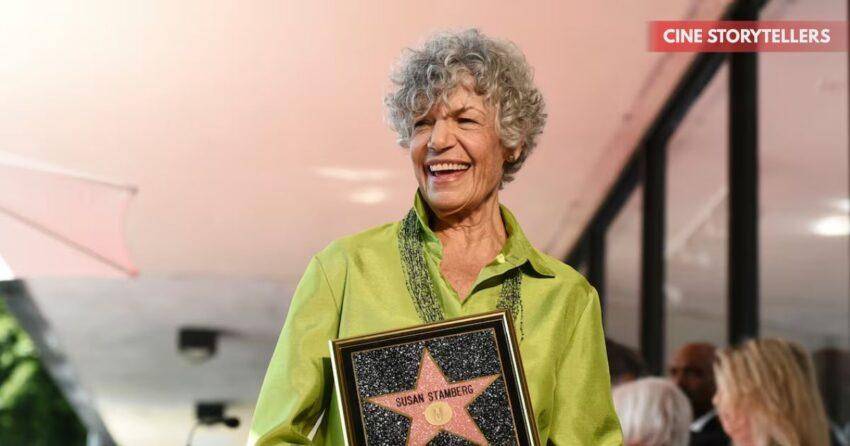Broadcast journalism has lost one of its most beloved voices. Susan Stamberg, a pioneering figure in American public radio and the first woman to anchor a national nightly news program, has died at age 87. Known for her warmth, wit, and curiosity, Stamberg was one of NPR’s original voices—shaping how millions listened to news, art, and culture for more than five decades. Her passing marks the end of an era in American storytelling.
A Life Defined by Curiosity and Courage
Born Susan Levitt on September 7, 1938, in Newark, New Jersey, and raised in New York City, Susan Stamberg’s love for radio began early. As a child, she would listen for hours to radio dramas and news bulletins, fascinated by the power of storytelling through sound.
After graduating from Barnard College with a degree in English in 1959, she worked as an editor and writer before transitioning into broadcasting—a field where few women had a voice at the time. Her natural curiosity and conversational tone quickly set her apart.
When public radio was still in its infancy, Stamberg took a job at WAMU-FM, a local Washington, D.C. station affiliated with American University. That early experience laid the foundation for a career that would change the landscape of radio journalism forever.
The Birth of NPR and a Star Behind the Mic
In 1971, when National Public Radio (NPR) was founded, Susan Stamberg joined the network’s small but passionate team. Her timing was perfect: NPR needed authentic, relatable voices who could make complex topics feel personal—and Stamberg embodied that mission.
In 1972, she became the co-host of All Things Considered, NPR’s flagship evening news program. This made her the first woman ever to anchor a national nightly news show in the United States. At a time when female journalists were often relegated to “soft news,” Stamberg proved that a woman’s voice could carry authority, empathy, and power on air.
Listeners were drawn to her blend of intellect and humor. Her interviews were never stiff or scripted; she approached guests with genuine curiosity—whether she was speaking with a president, a poet, or an astronaut.
Breaking Barriers in Broadcasting
At NPR, Susan Stamberg helped create what would become known as “the NPR sound”—a balance of news, culture, and humanity that resonated with audiences. She wasn’t afraid to ask difficult questions, but she also wasn’t afraid to laugh or show emotion.
Her groundbreaking approach helped redefine journalism. She demonstrated that radio could be both intimate and intelligent, challenging the traditional newsroom formula dominated by male anchors.
She was also a trailblazer for women in media, mentoring young journalists like Nina Totenberg, Cokie Roberts, and Linda Wertheimer—the group often referred to as NPR’s “Founding Mothers.” Together, they paved the way for future generations of women broadcasters.
A Voice for Every Season
Even after leaving All Things Considered in 1986, Stamberg’s voice remained a fixture on NPR. She became a special correspondent, covering arts, culture, and human-interest stories that showcased her signature warmth.
She also hosted Weekend Edition Sunday from 1987 to 1989, where she explored topics ranging from classical music to international affairs. Her versatility proved that she was far more than a newsreader—she was a storyteller, educator, and cultural bridge.
One of her most cherished traditions was her annual Thanksgiving cranberry relish segment. Each year, Stamberg shared her late mother-in-law’s unconventional recipe—featuring cranberries, sour cream, horseradish, and onion. The quirky, humorous bit became a beloved radio tradition that fans looked forward to every November.
Tributes and Impact on NPR
Following news of her death on October 16, 2025, tributes poured in from colleagues, listeners, and prominent journalists who had grown up listening to her. NPR CEO John Lansing described her as “the voice that defined the heart of NPR—curious, compassionate, and courageous.”
Veteran NPR reporter Nina Totenberg said, “Susan taught us that warmth and intelligence could coexist on the air. She was our north star.”
Her death not only marks the loss of a beloved personality but also a defining chapter in American media. Few journalists have influenced the sound and spirit of public broadcasting the way Susan Stamberg did.
Awards, Recognition, and Lasting Influence
Throughout her illustrious career, Stamberg received numerous awards and honors. She was inducted into the Radio Hall of Fame in 1996, a recognition of her pioneering achievements.
Her legacy extends beyond awards—it lives in every NPR broadcast that embraces storytelling with authenticity and empathy.
Stamberg also co-authored several books, including Every Night at Five and Talk: NPR’s Susan Stamberg Considers All Things, reflecting her philosophy of lifelong curiosity.
Her final years were spent in Washington, D.C., where she continued mentoring journalists and occasionally contributing to NPR specials. She retired officially in September 2025, just weeks before her passing.
Cause of Death and Family Statement
Susan Stamberg’s death was confirmed by NPR on October 16, 2025. While the cause of death has not been publicly disclosed, her family and NPR colleagues stated she passed peacefully, surrounded by loved ones.
She is survived by her son, Josh Stamberg, an accomplished actor known for roles in Drop Dead Diva and Parenthood, and two granddaughters. Her husband, Louis C. Stamberg, predeceased her in 2007.
In their statement, her family said:
“Susan lived with curiosity, courage, and kindness. She believed every voice deserved to be heard—and she used hers to make that happen.”
Remembering a Legacy That Will Never Fade
Susan Stamberg’s influence continues to ripple across generations. She made journalism human again—turning news into storytelling, interviews into conversations, and facts into moments of connection.
Her warmth, intelligence, and laughter defined NPR’s early years and continue to shape its present. For millions of listeners, Susan Stamberg wasn’t just a broadcaster—she was a companion on their morning drives, a teacher of empathy, and a voice that made the world feel a little smaller and kinder.
In her own words, Stamberg once said:
“Radio is magic—it’s intimacy without intrusion. When people listen, they imagine. And that’s where connection begins.”
That magic, born of her love for sound and storytelling, remains her greatest gift to journalism.
Also Read : Landman Season 2: Release Date, Cast, Plot Details, and What to Expect
FAQs
Q1. When did Susan Stamberg die?
Susan Stamberg passed away on October 16, 2025, at the age of 87.
Q2. What was Susan Stamberg known for?
She was the first woman to anchor a national nightly news program and one of the founding voices of NPR’s All Things Considered.
Q3. What made her style unique?
Her conversational tone, humor, and curiosity broke traditional news formats, helping to shape the “NPR sound.”
Q4. What awards did she receive?
Stamberg was inducted into the Radio Hall of Fame in 1996 and honored with numerous journalism and lifetime achievement awards.
Q5. Who survives her?
She is survived by her son, actor Josh Stamberg, and two granddaughters. Her husband, Louis C. Stamberg, died in 2007.
Q6. What was Susan Stamberg’s most famous NPR moment?
Her annual Thanksgiving cranberry relish segment became an NPR tradition and symbolized her playful, down-to-earth spirit.
Join our WhatsApp channel for more updates and information about celebrities and entertainment

I’m Atul Kumar, founder of Cine Storytellers and an entertainment creator with 5+ years of experience. I cover films, celebrities, music, and OTT content with a focus on accurate, ethical, and engaging storytelling. My goal is to bring readers trustworthy entertainment news that informs, inspires, and goes beyond gossip.
Discover more from Cine Storytellers
Subscribe to get the latest posts sent to your email.
